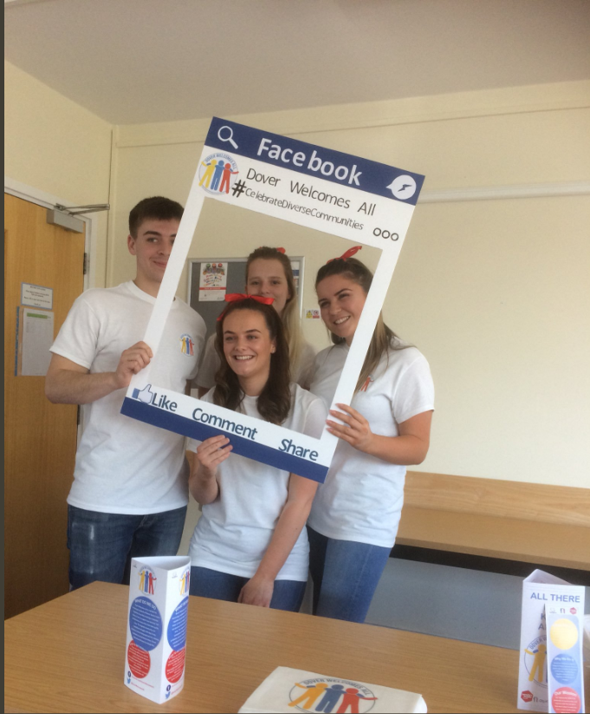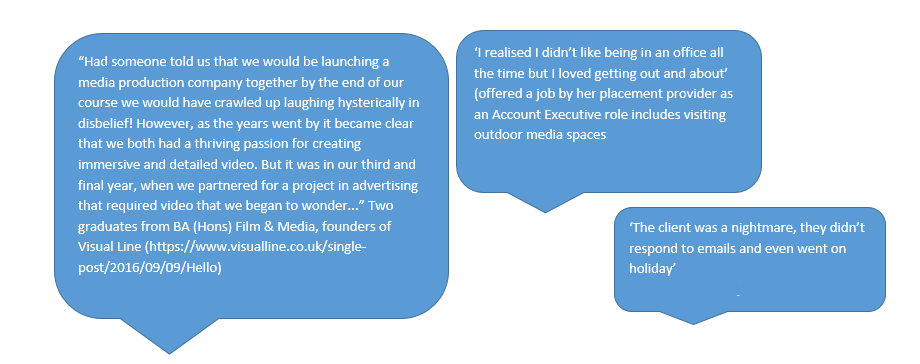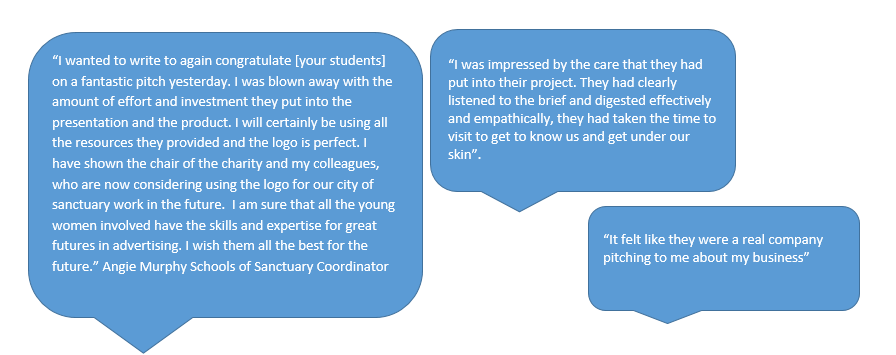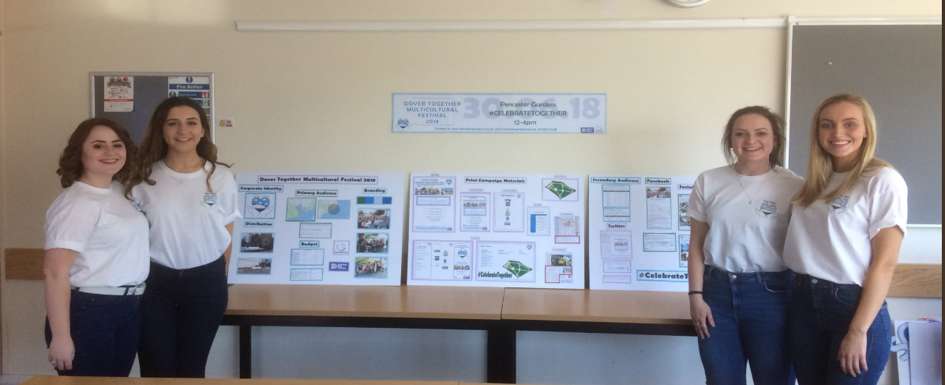The case study consists in using live client briefs across several modules on the Media and Communications programme.
The project was led by Sarah O’Hara, Senior Lecturer and Programme Suite Lead for Public Relations, Media and Marketing, Media and Communications and Multi Media Journalism.
Embedding employability into the curriculum
- Across the Media and Communications programme, students work on a number of projects which develop their graduate skills. These start off with in-house clients such as the Sustainability Department within the University, working internationally with overseas education providers and culminating in working on live client briefs in level 6. In addition to the activities, students work on developing their employability skills on the Professional Work Based Learning module: this can be through a traditional work placement, an internship or by working from home as a freelancer.

- An example of this activity is on the level 6 Advertising Practices module. On this practical module, students work on a live advertising brief for small non-for-profit clients. The module integrates several core elements of graduate employability in a flexible and responsive learning environment. The students have to work in teams and therefore overcome their initial resistance to group work. Teamwork is prevalent in the creative and media industries and therefore group work is a crucial preparation for the world of work, transforming the learning environment from being teacher-led to supportive learning teams (Smith et al. 2011).
- Sarah introduced tools to improve the learning collaboration, one of which is the use of an ‘elevator pitch’. An elevator pitch is a succinct and persuasive sales pitch based on the idea of having to impress a senior executive during a brief ride in an elevator and is a technique often used in interviews. In the first week after giving a module overview, the elevator pitch is introduced. Students have 10 minutes to develop a 60-second pitch, during which they reflect on the skills developed both at University and outside and write a personal SWOT (List of Strengths, Weaknesses, Opportunities and Threats). They then stand up and pitch to each other. They are encouraged to discuss their strengths as well as areas they struggle with, and the tutor promotes a positive atmosphere in which everyone can give honest and open feedback. The class then breaks and the groups form over a ‘Speed Dating’ activity with individuals matching their skillsets over coffee. By the time the class reconvenes, small groups have been formed, everyone has had a chance to reflect on and review their skills and there is open and honest dialogue within the groups.
- A couple of weeks’ later, Sarah delivers a workshop on active listening, creative brief writing and some activities around ‘managing client expectations’ to ensure that students are ready to meet the client and take the brief. The practical nature of the module means that students are partners in learning directing both the content and teaching depending on the clients’ needs as the brief evolves. As the campaigns develop, the students are encouraged to push back to ask for support and guidance in the creative execution and the background strategy. In the lead up to the live creative pitches, students benefit from the visit of an external coach who delivers a workshop on pitching including techniques on managing body language, answering questions and presentation skills all core interview techniques. The groups then have a peer review session for formative feedback before final live pitches to both the clients and tutors.
Evaluation
Key benefits
Looking at students’ outputs and their results, it is clear that there are many benefits to these projects when students actively engage with them:
- Student develop their own personal SWOTs, understand their personal strengths and weaknesses and have a plan to build on them. The activities also prepare them for ‘what is your biggest weakness’ type of interview question.
- Students learn personal lessons about what they want to do in their feedback, as their feedback below shows.
- Students gain key graduate skills such as teamwork, organisation skills, effective communication, professionalism, self-awareness, etc.
- Real experience will sit well on their CV and LinkedIn reference
Some hurdles on the way
Despite all these benefits, students have encountered challenges too. Sometimes, a project can go wrong: a client may change their mind about what they expect from the collaboration, they may leave the business, go on holiday or be off sick when the project needs completing. Problems can also arise from the students’ side of the projects: some students may not bother to engage, cannot take part for a variety of reasons (including extenuating circumstances), or think they know best and do not show the adaptability required. In these instances, Sarah works with both the groups and the individuals to ensure they gain from the module. She has for example been able to give students smaller projects to work on their own.
Current students and alumni feedback

Clients’ feedback

Resources and support
Smith, G., S., Smith, G. G., Sorensen, C., Gump, A., Heindel, A. J., Caris, M. and Martinez, C. D. (2011) ‘Overcoming student resistance to group work: Online versus face-to-face’, INTERNET AND HIGHER EDUCATION, 14(2), pp. 121-128.
If you want to know more about the project, please contact Sarah O’Hara at sarah.ohara@canterbury.ac.uk
If you are interested in embedding projects of this nature into your module or programme, please consult the Enterprise and Employability pages at https://www.canterbury.ac.uk/career-development/information-for-university-staff.aspx
 PRISM
PRISM Claire Haines
Claire Haines 2121
2121


